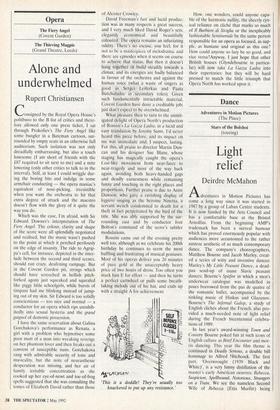Opera
The Thieving Magpie (Grand Theatre, Leeds)
Alone and underwhelnied
Rupert Christiansen
Consigned by the Royal Opera House's politburo to the B list of critics and there- fore allowed only one press ticket, I sat through Prokofiev's The Fiery Angel like some bungler in a Bateman cartoon, sur- rounded by empty seats in an otherwise full auditorium. Such isolation was not only dreadfully embarrassing, but also a touch lonesome (I am short of friends with the £87 required to sit next to me) and a mite lowering (only other critics to talk to in the interval). Still, at least I could wriggle dur- ing the boring bits and indulge in some armchair conducting — the opera maniac's equivalent of nose-picking, irresistible when you want the orchestra to hit that extra degree of attack and the maestro doesn't flow with the glory of it quite the way you do.
Which was the case, I'm afraid, with Sir Edward Downes's interpretation of The Fiery Angel. The colour, clarity and shape of the score were all splendidly negotiated and realised, but the music wasn't pushed to the point at which it perched perilously on the edge of insanity. The ride to Agrip- pa's cell, for instance, depicted in the inter- lude between the second and third scenes, should run crazy, deafening rampage. But in the Covent Garden pit, strings which should have screeched in hellish pitch- forked agony just squeaked and squealed like piggy little schoolgirls, while bursts of timpani had me blinking instead of jump- ing out of my skin, Sir Edward is too solidly conscientious — too nice and normal — a conductor for an opera which rips uninhib- itedly into sexual hysteria and the grand guignol of demonic possession' .
I have the same reservation about Galina Gorchakova's performance as Renata, a girl with a problem who hypnotises some poor mutt of a man into wreaking revenge on her phantom lover and then freaks out a convent of susceptible nuns. Gorchakova sang with admirable security of tone and musicality, but the note of neurasthenic desperation was missing, and her air of faintly irritable concentration as she cooked up her eye-of-newt and toe-of-frog spells suggested that she was consulting the tomes of Elizabeth David rather than those of Aleister Crowley.
David Freeman's fast and lucid produc- tion was in many respects a great success, and I very much liked David Roger's sets, elegantly economical and beautifully coloured. The opera remains an infuriating oddity. There's no excuse, you feel, for it not to be a masterpiece of melodrama, and there are episodes when it seems on course to achieve that status. But then it doesn't hang together' or build steadily towards a climax, and its energies are badly balanced in favour of the orchestra and against the human voice (what a waste of singers as good as Sergei Leiferkus and Paata Burchuladze in secondary roles). Given such fundamentally intractable material, Covent Garden have done a creditable job; just don't expect to be overwhelmed.
What pleasure then to turn to the unmit- igated delight of Opera North's production of Rossini's La Gazza Ladra, in a lucid and easy translation by Jeremy Sams. I'd never heard this piece before, and its impact on me was immediate and, I suspect, lasting. For this, all praise to director Martin Dun- can and his designer Sue Blanc, whose staging has magically caught the opera's C'osi-like movement from near-farce to near-tragedy and most of the way back again, avoiding both heavy-handed gags and deadly earnestness while remaining funny and touching in the right places and proportions. Further praise is due to Anne Dawson, who gave a ravishing display of leggiero singing as the heroine Ninetta, a servant wench condemned to death for a theft in fact perpetrated by the bird of the title. She was ably supported by the sur- rounding cast and by conductor Ivor Bolton's command of the score's subtler modulations.
Rossini came out of the evening pretty well too, although as we celebrate his 200th birthday he continues to seem the most baffling and frustrating of musical geniuses. Most of his operas deliver you 20 minutes of pure gold at the unacceptably heavy price of two hours of dross. Too often you mark him E for effort — and then he turns a perfect cartwheel or pulls some breath- taking melody out of hiS hat, and ends up with a straight A for achievement.
'This is a doddlel They're usually too knackered to put up any resistance.'
How, one wonders, could anyone capa- ble of the harmonic nullity, the sheerly cyn- ical reliance on cliché that marks so much of II Barbiere di Siviglia or the inexplicably fashionable Semiramide be the same person responsible for an opera as focused, as sup- ple, as humane and original as this one? How could anyone so lazy be so good, and vice versa?Anyway, I just hope that other British houses (Glyndebourne in particu- lar) will now take La Gazza Ladra into their repertories: but they will be hard pressed to match the little triumph that Opera North has worked upon it.


















































 Previous page
Previous page